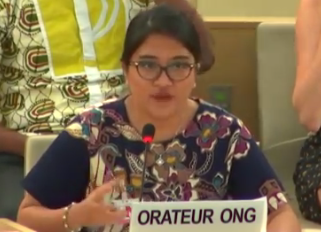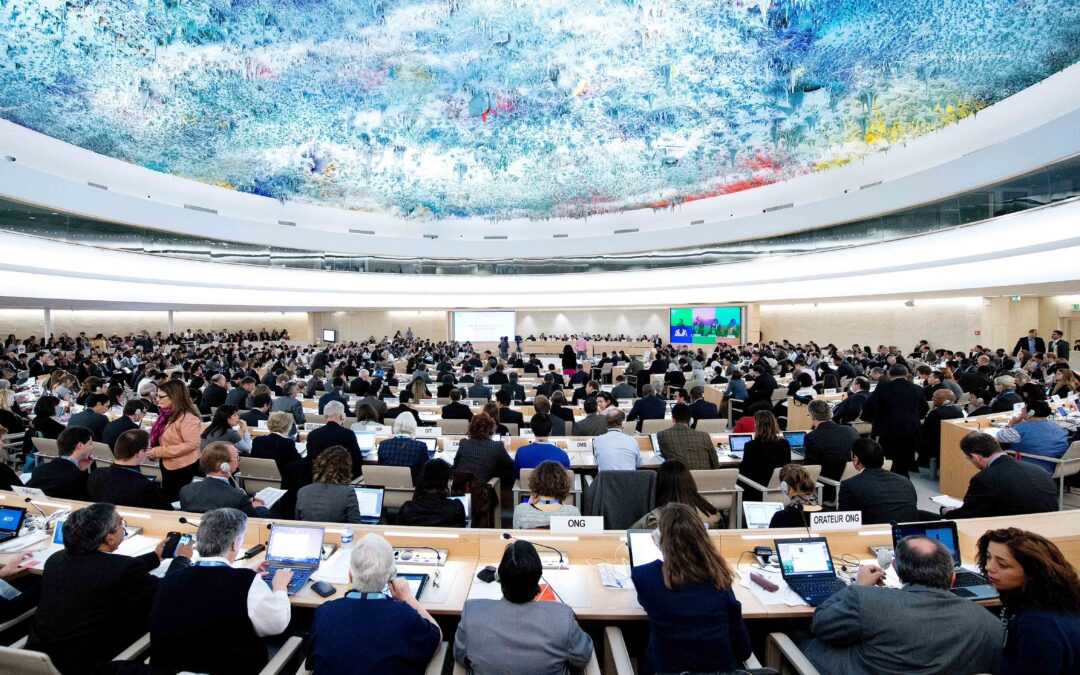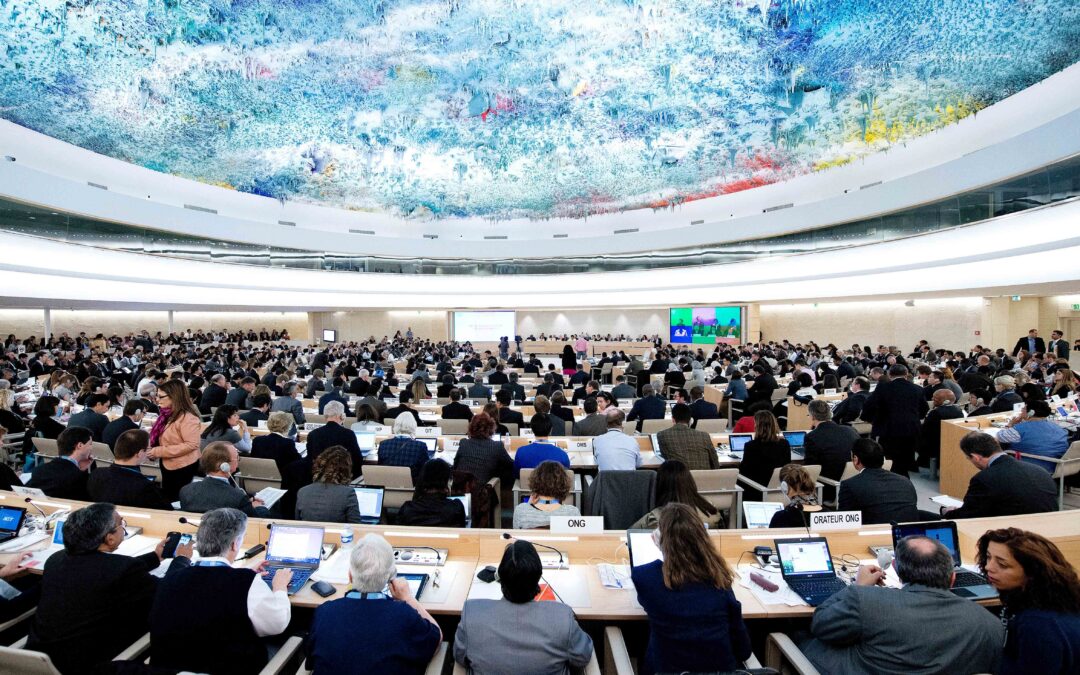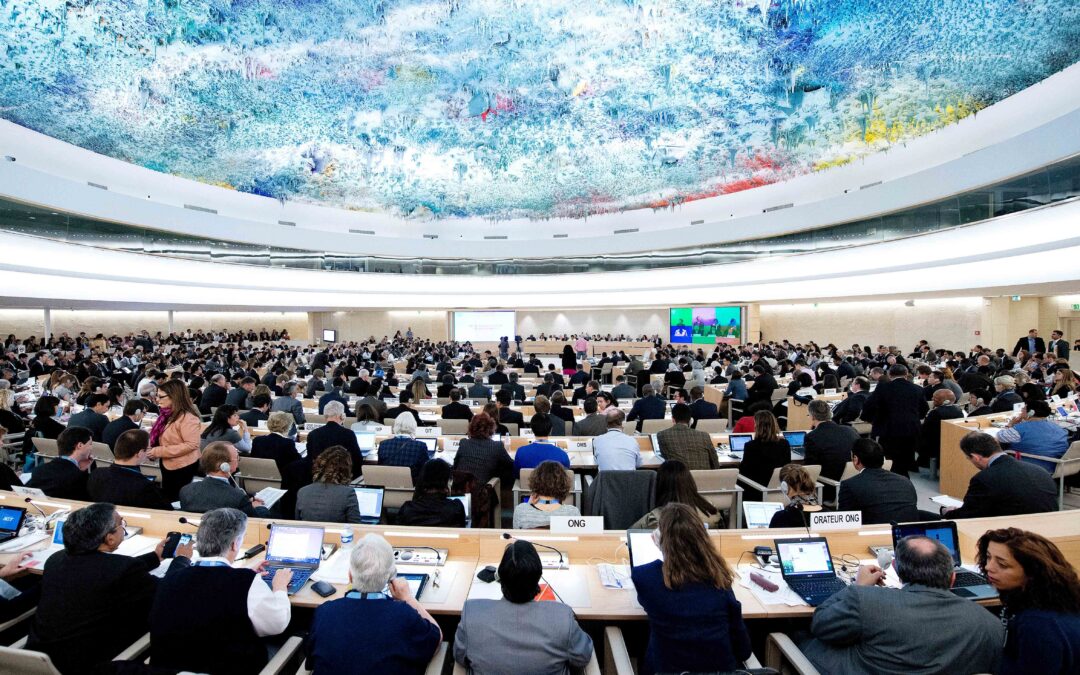
Jun 27, 2019 | Advocacy, Non-legal submissions
The ICJ highlighted the role of women in ensuring respect for human rights in relation to businesses, in a statement to the UN Human Rights Council today.
In an oral statement made during an interactive dialogue with the Working Group on Discrimination Against Women and the Working Group on the issue of human rights and transnational corporations and other business enterprises, the ICJ stated as follows (check against delivery):
The International Commission of Jurists (ICJ) welcomes the report of the Working Group on the issue of human rights and transnational corporations and other business enterprises, and agrees that despite years of progress, women continue to experience multiple forms of discrimination. Women’s voices continue to be unheard and they face insurmountable challenges as they use these voices to access justice on behalf of their communities.
We have seen numerous cases where women lead their communities in protesting abuses committed by business enterprises. Many of these communities are located in remote areas, far from courts or other mechanisms that could be used by them to seek justice. The women who lead these communities often do not identify as women human rights defenders. They see themselves as mothers protecting the health of their families or the land from which they grow their food and earn their living. Because of where these communities are located, local government authorities play a significant role on whether or not these women are heard or are able to access justice.
The women farmers of Kendeng in Indonesia, for instance, have been protesting the operation of a cement factory in their area, which contaminate their water and land. In 2016, the Supreme Court of Indonesia had already ruled in favor of these women farmers and their community, and ordered the revocation of the cement factory’s permit. To this day, however, the cement factory continues to operate, ignoring the final order of the Supreme Court. The Kendeng women farmers have raised the non-implementation of the Supreme Court’s order with the Governor of Central Java and the Indonesian government, but their voices remain unheard.
In the Philippines, the women community leaders of Pio V. Corpus, Masbate, have been protesting plans to establish a cement factory and a coal-fired power plant in their town. They allege that their local government leaders approved plans for this factory and power plant without consultation and in blatant disregard of the disastrous impact these would have on the environment and people’s health.
Mr. President, we join the Working Group in urging States and business enterprises to ensure meaningful participation of potentially affected women in all stages of human rights due diligence. We also urge States to take measures to ensure that women – wherever they may be located – are able to access justice for abuses committed by business. Finally, we recommend that local government authorities be made aware of the Guiding Principles and able to integrate the gender framework and guidance in discharging their human rights responsibilities.
Thank you.

Oct 19, 2018 | Advocacy, Non-legal submissions
The International Commission of Jurists participated in the fourth session of the open-ended intergovernmental working group on transnational corporations and other business enterprises with respect to human rights that took place at the Palais de Nations from 15-18 October 2018. Below are the interventions the ICJ made at this session.
UN-ICJ statement IGWG4 general debate-Advocacy-ENG-2018
UN-ICJ statement IGWG4 prevention-Advocacy-ENG-2018
UN-ICJ statement IGWG4 legal liability-Advocacy-ENG-2018

Oct 12, 2018 | Events, News
First side event: Multi-stakeholder dialogue on the scope and content of a treaty on business and human rights, Monday 15 October 2018, from 13.00-15.00, Room XXVII, Palais des nations.
Second side event: What kind of international monitoring and/or adjudicating mechanism do we need? Tuesday 16 October 2018, from 13.00-15.00 Room XXI, Palais des nations.
On 26 June 2014, the United Nations Human Rights Council (HRC) adopted Resolution 26/9 establishing an “open ended intergovernmental working group on transnational corporations and other business enterprises with respect to human rights” with the mandate to “elaborate an international legally binding instrument to regulate, in international human rights law, the activities of transnational corporations and other business enterprises”.
The first two sessions were dedicated to open deliberations about the format, scope and content of the future instrument, and a document with «elements» of the treaty was presented to the third session in 2017.
The fourth session of the OEIWG opens on 15 October with a «zero draft» of a treaty prepared by the Working Group Chairperson on the table for discussion.
The draft has so far met a mixed reception.
While much of the debate on a treaty has focussed on substantive questions around the scope and nature of substantive rights and responsibilities, the international monitoring and adjudicating mechanism has so far received far less attention.
Both side events organized on October 15-16 by the ICJ will be a space of discussion where stakeholders will be invited to share their views on key sections of the «zero draft» on business and human rights as well as on the best way to proceed in the negotiations in the next period.
Multi-stakeholder dialogue on the scope and content of a treaty on business and human rights (flyer in PDF)
What kind of international monitoring and/or adjudicating mechanism do we need? (flyer in PDF)
Contact:
Carlos Lopez, ICJ Senior Legal Adviser, t: 022 979 3816; e: carlos.lopez(a)icj.org

Jun 25, 2018 | Advocacy, Non-legal submissions
The ICJ today spoke at the UN on the role of judicial councils, judicial independence in Turkey and Poland, and on business and human rights in Peru.
The statement was made at the UN Human Rights Council during the interactive dialogue with the Special Rapporteur on Independence of Judges and Lawyers and the Working Group on Business and Human Rights.
The statement on judicial councils and independence was made jointly with the Commonwealth Magistrates’ and Judges’ Association. The whole statement read as follows:
“Mr President,
The International Commission of Jurists (ICJ) and Commonwealth Magistrates’ and Judges’ Association (CMJA) welcome the report of the Special Rapporteur on the Independence of Judges and Lawyers (A/HRC/38/38) on the role of judicial councils and similar bodies.
Based on many decades of relevant experience around the world, we urge that:
All countries should consider establishing an independent judicial council. Reliance on constitutional customs, cultures, and traditions alone often proves insufficient if a crisis arises.
To guarantee independence, a majority of members should be judges elected by their peers. Any other members must also be independent. The Head of State, executive or legislative officials, or political candidates, should not be members. Proactive measures should address under-representation of women or persons from minority or marginalized groups.
Such bodies should be responsible for all decisions relating to the selection, appointment, promotion, transfer, discipline, suspension and removal of judges.
As an example of concern, in Turkey following constitutional reform in 2017 no member of the Council of Judges and Prosecutors is elected by their peers, contributing to a lack of institutional independence of the judiciary. We also share the concerns for lawyers in Turkey already expressed by The Law Society and other colleagues today.
On the report on the visit to Poland (A/HRC/38/38/Add.1), we concur that reforms in the name of efficiency and accountability have undermined the independence of the Constitutional Tribunal, the Supreme Court and the National Council of the Judiciary, and effectively placed the entire judiciary under “control of the executive and legislative branches” (para 74). Mr Special Rapporteur, how can other States assist in securing full implementation of your recommendations on Poland?
The findings of the Working Group on Business and Human Rights report on its mission to Peru (A/HRC/38/48/Add.2) are of great concern, that “large number of human rights defenders and local leaders” were reportedly killed, attacked or threatened for defending the environment and land rights, legitimate social protest is criminalized, and wide use of states of exception and the armed forces have lead to serious abuses. The ICJ urges Peru to implement the recommendations and asks the Working Group what it will do to follow up?
Thank you.”

Jun 9, 2017 | Advocacy, Non-legal submissions
The ICJ today delivered an oral statement at the UN Human Rights Council, addressing global responses to corporate impunity, and addresing the role of judges and lawyers in relation to refugees and migrants.
The statement came in a clustered interactive dialogue with the UN Working Group on Business and Human Rights and the Special Rapporteur on the Human Rights of Migrants. These independent experts appointed by the Council were presenting their respective annual reports to the Council.
The ICJ stated as follows:
The ICJ welcomes the Study of the Working Group on Business and Human Rights, on cross-border cooperation between States with respect to law enforcement in relevant cases (A/HRC/35/33). The ICJ concurs with the Working Group’s concern for the “lack of political will by States to address business-related human rights abuses through the lens of criminal law” (para. 4) and the near-total lack of investigations and prosecutions against companies regarding human rights abuses and international crimes (para. 87).
The ICJ also concurs that a global approach is needed to address corporate impunity and supports the Working Group’s recommendations for adoption of legal frameworks imposing liability on legal entities (para. 93), creation of specialized investigative and prosecutorial units in cross-border human rights cases, and joint investigations. The ICJ would like to ask how the Working Group will support States to put these recommendations into practice?
The ICJ also welcomes the proposal of the Special Rapporteur on the Human Rights of Migrants for a 2035 agenda for facilitating human mobility. We particularly support the goal of effective access to justice for all migrants, and the targets and indicators on access to lawyers and courts for this goal, and in relation to returns and detention.
The ICJ has published a set of Principles on the Role of Judges and Lawyers in Relation to Refugees and Migrants, developed in consultation with leading practitioners and experts from around the world. We encourage States and other actors to take account of the detailed guidance in the ICJ Principles, including during the process for adoption of the Global Compacts foreseen by the New York Declaration for Refugees and Migrants, and in considering the Special Rapporteur’s proposal. We would like to ask the Special Rapporteur how States can better recognise and enable the role of judges and lawyers in relation to migrants?
The Chair of the Working Group on Business and Human Rights, in his concluding remarks, recognised the statement of the ICJ, and answered that the Working Group plans to follow up its report with a continuing conversation about its recommendations, and will reach out to stakeholders for further consultation on what more the WG can do in this regard.
The Special Rapporteur on Human Rights of Migrants also recognised the statement of the ICJ, and in his reponse emphasised that access to justice for migrants is key, including competent well-resourced lawyers, access to meaningful recourse, better funding for National Human Rights Institutions and ombudspersons, and providing in administrative law procedural safeguards that are commensurate to the risks that migrants face when such decisions are applied to them.









